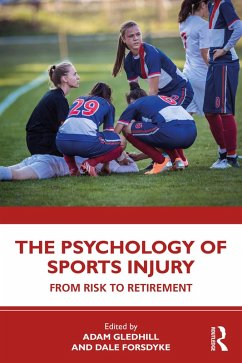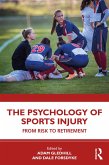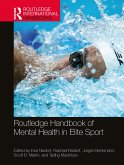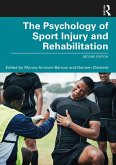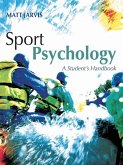The Psychology of Sports Injury (eBook, PDF)
From Risk to Retirement
Redaktion: Gledhill, Adam; Forsdyke, Dale
40,95 €
40,95 €
inkl. MwSt.
Sofort per Download lieferbar

20 °P sammeln
40,95 €
Als Download kaufen

40,95 €
inkl. MwSt.
Sofort per Download lieferbar

20 °P sammeln
Jetzt verschenken
Alle Infos zum eBook verschenken
40,95 €
inkl. MwSt.
Sofort per Download lieferbar
Alle Infos zum eBook verschenken

20 °P sammeln
The Psychology of Sports Injury (eBook, PDF)
From Risk to Retirement
Redaktion: Gledhill, Adam; Forsdyke, Dale
- Format: PDF
- Merkliste
- Auf die Merkliste
- Bewerten Bewerten
- Teilen
- Produkt teilen
- Produkterinnerung
- Produkterinnerung

Bitte loggen Sie sich zunächst in Ihr Kundenkonto ein oder registrieren Sie sich bei
bücher.de, um das eBook-Abo tolino select nutzen zu können.
Hier können Sie sich einloggen
Hier können Sie sich einloggen
Sie sind bereits eingeloggt. Klicken Sie auf 2. tolino select Abo, um fortzufahren.

Bitte loggen Sie sich zunächst in Ihr Kundenkonto ein oder registrieren Sie sich bei bücher.de, um das eBook-Abo tolino select nutzen zu können.
The Psychology of Sports Injury: From Risk to Retirement provides a critical overview of the psychology of sports injury, covering the 5Rs of sports injury: risk, response, rehabilitation, return to sport, and retirement.
- Geräte: PC
- mit Kopierschutz
- eBook Hilfe
Andere Kunden interessierten sich auch für
![The Psychology of Sports Injury (eBook, ePUB) The Psychology of Sports Injury (eBook, ePUB)]() The Psychology of Sports Injury (eBook, ePUB)40,95 €
The Psychology of Sports Injury (eBook, ePUB)40,95 €![Routledge Handbook of Mental Health in Elite Sport (eBook, PDF) Routledge Handbook of Mental Health in Elite Sport (eBook, PDF)]() Routledge Handbook of Mental Health in Elite Sport (eBook, PDF)46,95 €
Routledge Handbook of Mental Health in Elite Sport (eBook, PDF)46,95 €![Unpacking Depth Sport Psychology (eBook, PDF) Unpacking Depth Sport Psychology (eBook, PDF)]() Tom FerraroUnpacking Depth Sport Psychology (eBook, PDF)37,95 €
Tom FerraroUnpacking Depth Sport Psychology (eBook, PDF)37,95 €![Cultural Sport Psychology and Elite Sport in Singapore (eBook, PDF) Cultural Sport Psychology and Elite Sport in Singapore (eBook, PDF)]() Nicholas de CruzCultural Sport Psychology and Elite Sport in Singapore (eBook, PDF)42,95 €
Nicholas de CruzCultural Sport Psychology and Elite Sport in Singapore (eBook, PDF)42,95 €![The Psychology of Sport Injury and Rehabilitation (eBook, PDF) The Psychology of Sport Injury and Rehabilitation (eBook, PDF)]() The Psychology of Sport Injury and Rehabilitation (eBook, PDF)40,95 €
The Psychology of Sport Injury and Rehabilitation (eBook, PDF)40,95 €![Routledge Handbook of Qualitative Research in Sport and Exercise (eBook, PDF) Routledge Handbook of Qualitative Research in Sport and Exercise (eBook, PDF)]() Routledge Handbook of Qualitative Research in Sport and Exercise (eBook, PDF)57,95 €
Routledge Handbook of Qualitative Research in Sport and Exercise (eBook, PDF)57,95 €![Sport Psychology: A Student's Handbook (eBook, PDF) Sport Psychology: A Student's Handbook (eBook, PDF)]() Matt JarvisSport Psychology: A Student's Handbook (eBook, PDF)40,95 €
Matt JarvisSport Psychology: A Student's Handbook (eBook, PDF)40,95 €-
-
-
The Psychology of Sports Injury: From Risk to Retirement provides a critical overview of the psychology of sports injury, covering the 5Rs of sports injury: risk, response, rehabilitation, return to sport, and retirement.
Dieser Download kann aus rechtlichen Gründen nur mit Rechnungsadresse in A, B, BG, CY, CZ, D, DK, EW, E, FIN, F, GR, HR, H, IRL, I, LT, L, LR, M, NL, PL, P, R, S, SLO, SK ausgeliefert werden.
Produktdetails
- Produktdetails
- Verlag: Taylor & Francis eBooks
- Seitenzahl: 238
- Erscheinungstermin: 24. März 2021
- Englisch
- ISBN-13: 9780429673078
- Artikelnr.: 61249552
- Verlag: Taylor & Francis eBooks
- Seitenzahl: 238
- Erscheinungstermin: 24. März 2021
- Englisch
- ISBN-13: 9780429673078
- Artikelnr.: 61249552
- Herstellerkennzeichnung Die Herstellerinformationen sind derzeit nicht verfügbar.
Adam Gledhill is Course Director in Sport, Exercise and Health Sciences at Leeds Beckett University, UK. He is a Fellow of the British Association of Sport and Exercise Sciences (BASES) and a BASES Accredited Sport and Exercise Scientist. Dr. Gledhill is the Deputy Chair of the BASES Division of Psychology and developed the psychology of sports injury and rehabilitation standards for the British Association of Sports Rehabilitators and Trainers Education Framework. Dale Forsdyke is Senior Lecturer in Sports Injury Management at York St John University, UK and a Society of Sports Therapists Accredited Sports Therapist. Dale is an experienced educator and practitioner, with 20 years' experience of teaching on sports injury related courses, research interests in psychological factors and return to sport outcomes, and over 10 years' experience as an injury practitioner across a range of sports.
Part 1. The role of psychology in sports injury risk and injury risk reduction 1. The injury prone athlete: Psychosocial risk factors in sports injury 2. Prevention is better than cure: The role of psychological interventions in sports injury risk reduction Part 2. Psychological responses to sports injury 3. Personal and situational factors affecting psychological response to sport injuries 4. The downside of sports injury: poor mental health in injured athletes 5. The upside of sports injury and disability: Personal growth following adversity Part 3. Enhancing sports injury rehabilitation experiences for injured athletes 6. Believe in your ability to create change: Psychosocial factors influencing sports injury rehabilitation adherence 7. Are you a buffer or an amplifier?: The role of social support in the effective return to sport following injury 8. Seeing is believing: Imagery use during injury rehabilitation 9. Does it pay to pay attention? Making a case for mindfulness-based approaches in injury rehabilitation Part 4. The role of psychology in understanding return and non-return to sport decisions 10. Is my athlete REALLY ready to return to sport? Psychological factors and returning to sport following injury 11. They think it's all over: Injury-related retirement in sport Part 5. Special interests in sports injury 12. The psychological aspect of anterior cruciate ligament injuries 13. ""It's my concussion story, and I want it to be heard": Understanding the psychology of concussion experience 14. Spinal cord injury and sport 15. "But I need you to play": Coach influences on athlete and team medical outcomes 16. The coffee break to close the book...Where do we go from here?
Part 1. The role of psychology in sports injury risk and injury risk reduction 1. The injury prone athlete: Psychosocial risk factors in sports injury 2. Prevention is better than cure: The role of psychological interventions in sports injury risk reduction Part 2. Psychological responses to sports injury 3. Personal and situational factors affecting psychological response to sport injuries 4. The downside of sports injury: poor mental health in injured athletes 5. The upside of sports injury and disability: Personal growth following adversity Part 3. Enhancing sports injury rehabilitation experiences for injured athletes 6. Believe in your ability to create change: Psychosocial factors influencing sports injury rehabilitation adherence 7. Are you a buffer or an amplifier?: The role of social support in the effective return to sport following injury 8. Seeing is believing: Imagery use during injury rehabilitation 9. Does it pay to pay attention? Making a case for mindfulness-based approaches in injury rehabilitation Part 4. The role of psychology in understanding return and non-return to sport decisions 10. Is my athlete REALLY ready to return to sport? Psychological factors and returning to sport following injury 11. They think it's all over: Injury-related retirement in sport Part 5. Special interests in sports injury 12. The psychological aspect of anterior cruciate ligament injuries 13. ""It's my concussion story, and I want it to be heard": Understanding the psychology of concussion experience 14. Spinal cord injury and sport 15. "But I need you to play": Coach influences on athlete and team medical outcomes 16. The coffee break to close the book...Where do we go from here?
